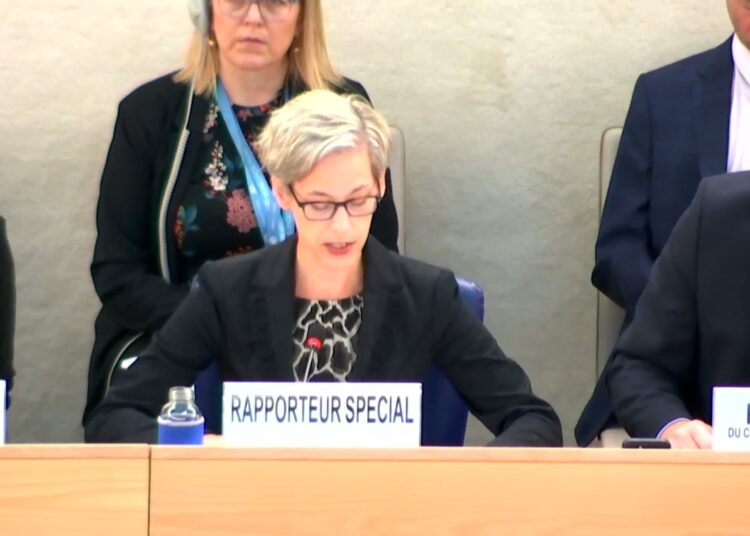Nordic Monitor/Stockholm
The United Nations’ point person on judicial independence has warned Turkey of a troubling pattern of systemic government interference in the judiciary, which is eroding judicial autonomy and resulting in mass purges of judges and prosecutors as well as the persecution of legal professionals.
In a communication to the Turkish government, Margaret Lockwood Satterthwaite, the United Nations special rapporteur on the independence of judges and lawyers, expressed deep concern about reports on the current situation of judges, prosecutors and lawyers, all of whom are increasingly subject to government interference in Turkey.
Satterthwaite highlighted the arbitrary removal, suspension and imprisonment of thousands of judges and prosecutors by the Turkish government following a false flag coup attempt in July 2016, actions aimed at undermining the judiciary’s independent functioning.
She noted that the government appears to be abusing broad anti-terrorism powers to target legal professionals, violating the fundamental principle of judicial independence, which holds that judges should not face criminal or disciplinary action based on the content of their rulings.
In 2016 and 2017 the government of President Recep Tayyip Erdogan dismissed or arrested over 4,300 judges and prosecutors, accusing them of affiliation with the Gülen movement, a group critical of the government, without providing solid evidence of criminal activity.
The faith-based Gülen movement, inspired by the teachings of Turkish Muslim scholar Fethullah Gülen, who passed away on Sunday, has primarily focused on interfaith dialogue, outreach activities and education. Since its inception in the 1960s, the movement has never been linked to violence but has been systematically targeted by radical Islamist groups, ultranationalists and far-right networks.
The text of the UN communication was sent to Turkey on June 21, 2024 by Margaret Lockwood Satterthwaite, the United Nations special rapporteur on the independence of judges and lawyers:
Gülen’s strong criticism of the Erdogan government, particularly on issues of widespread corruption and Turkey’s support for armed Islamist groups in Syria, put the movement in the direct line of government repression. In 2014, following a major graft investigation in December 2013 that implicated Erdogan and his inner circle, the government launched false terrorism cases against the movement and its members.
Since then, over half a million people alleged to be affiliated with the Gülen movement have faced politically motivated legal actions, with many resulting in wrongful terrorism convictions and lengthy prison sentences.
Following the mass purges of thousands of judges and prosecutors through arbitrary and summary executive decisions, the Erdogan government hastily recruited nearly 10,000 individuals from the ranks of the ruling Islamist Justice and Development Party (AKP) and its ally, the far-right Nationalist Movement Party (MHP), to fill the vacancies.
Consequently, courts and prosecutor’s offices became populated with personnel who are ideologically and politically aligned with the government, often acting without regard for the rule of law and due process when punishing those deemed critical of the administration.
Similarly, thousands of lawyers have been the subjects of criminal charges based on fabricated evidence, resulting in mass arrests that have created a chilling effect among legal professionals. These actions were designed to reinforce the Erdogan government’s dominance over the judiciary, further undermining judicial independence.
The UN communication also highlighted the use of the ByLock messaging app as evidence in terrorism cases, despite the absence of any content indicating actual criminal activity. ByLock was available for download on both the Android and the iOS platforms and had been installed on hundreds of thousands of mobile devices worldwide before it was shut down in early 2016.
On September 26, 2023 the European Court of Human Rights (ECtHR) issued a landmark decision ruling that the conviction of Yüksel Yalçınkaya, a teacher in Turkey, on terrorism charges — specifically for using the ByLock app — was unjust. Despite the Turkish Constitution mandating compliance with ECtHR rulings, Turkey has refused to abide by this decision.

“Taking into consideration the widespread use of messaging apps in the world, as well as the right of individuals to freedom of opinion and expression, I am concerned at allegations that simply downloading one of these applications (ByLock) has been used systematically by the Turkish judiciary as evidence to support an accusation of terrorism,” Satterthwaite said.
“Considering the alleged number of cases that have used this data as evidence for conviction, I join others in expressing concerns over the process of acquisition and analysis of the ByLock data under the law governing data retention; the evidentiary value of the ByLock evidence; and the reliability, accuracy, authenticity and integrity of the ByLock data on which the allegations of ByLock use are predicated.”
She called on Turkish authorities to retry cases that relied on the use of ByLock.
According to the communication, the persecution of lawyers in Turkey has profound implications for the rule of law and human rights. The UN rapporteur emphasized that the ability of lawyers to defend their clients without fear of reprisal is a cornerstone of any functioning democracy. However, she warned that the current climate of fear and intimidation within Turkey’s legal system threatens this foundational principle.
The communication exposes the dismal state of affairs in Turkey’s judiciary, which is facing a profound crisis. The mass dismissal of judges, the persecution of lawyers and the reliance on highly questionable digital evidence such as ByLock are eroding judicial independence and undermining the right to a fair trial.
International human rights bodies have repeatedly urged Turkey to address these issues; however, meaningful reform has yet to materialize.
The Erdogan government has not responded to the concerns expressed in the UN communiqué, which was issued as part of Turkey’s obligations under the International Covenant on Civil and Political Rights (ICCPR) and the Convention for the Protection of Human Rights and Fundamental Freedoms (European Convention on Human Rights), both of which Turkey has ratified.












